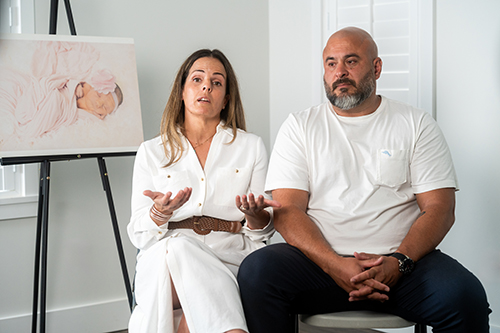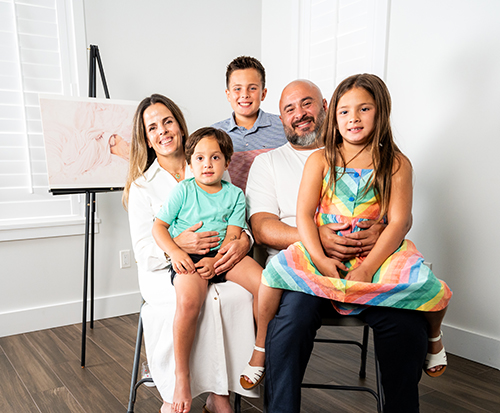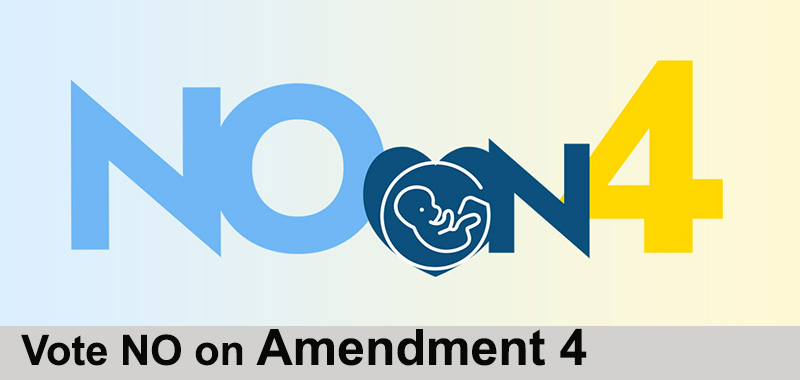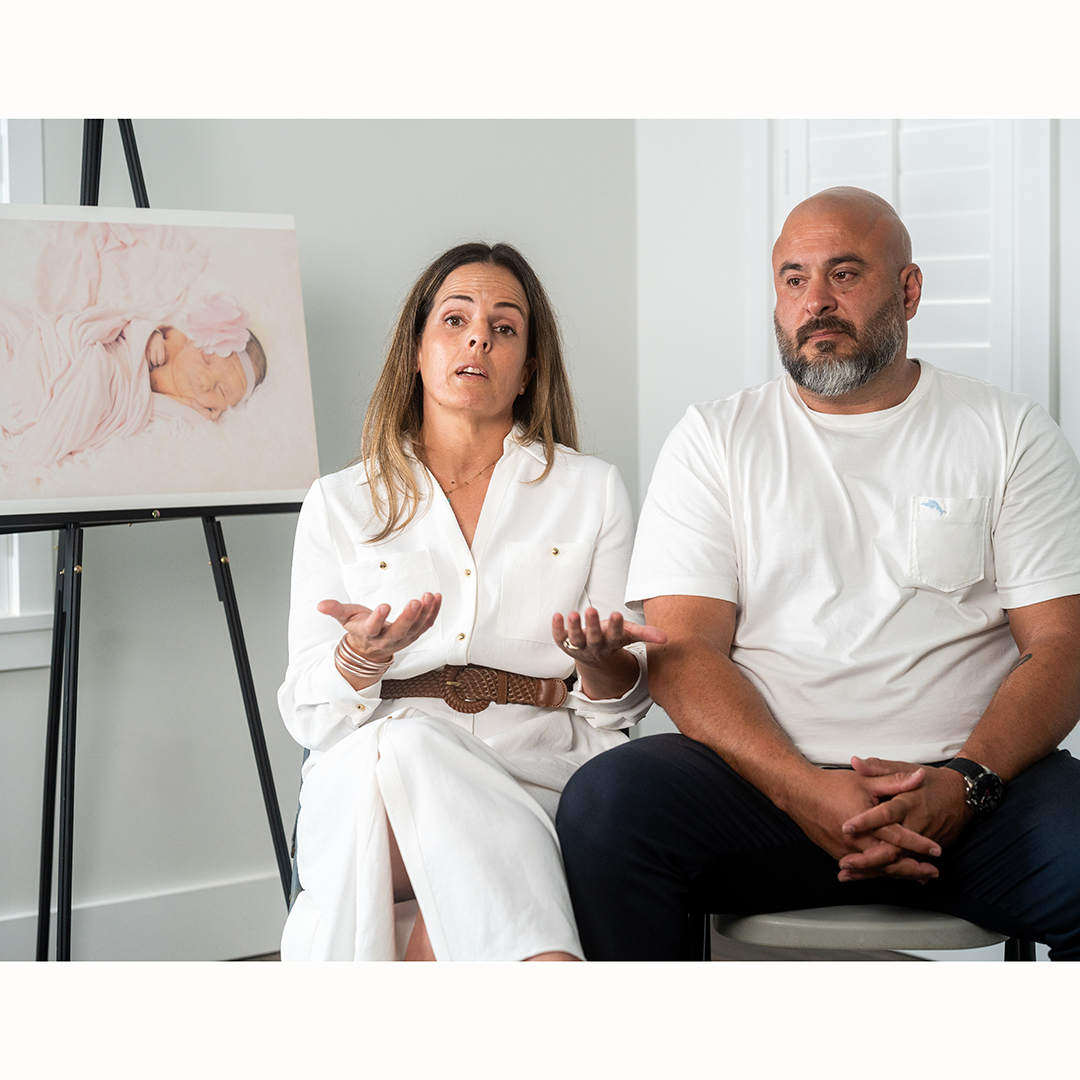By Emily Chaffins -
MIAMI | Upon discovering on June 22, 2015, that her unborn baby had the genetic disorder Trisomy 13, her mother Christie Acosta Mora also inquired about the baby’s gender.
She was outraged by the doctor’s reply: “Do you really want to know the gender?” When Christie pressed, the doctor said, “It is XX,” rather than say their baby was a girl. The doctor’s dehumanizing statement “haunts” Christie to this day.
To this doctor and some of the other medical practitioners that Christie Acosta Mora and her husband John Mora encountered, their child’s life was deemed less valuable because of her condition. Christie, John – and ultimately baby Vida Elyse herself – proved them wrong.

Photographer: COURTESY
Christie Acosta Mora and her husband John Mora are filmed near a photograph of their daughter, Vida Elyse July 28, 2024, during the filming for the Archdiocese of Miami’s campaign against Amendment 4. The couple shared the story of their daughter, who had Trisomy 13 and who had a short life, and they talked about the gifts her life brought to their family and community.
The Mora family shared their story in an interview with the Archdiocese of Miami Office of Communications and Florida Catholic for the Archdiocese of Miami’s “Vote NO On Amendment 4” campaign. Amendment 4 – a proposed amendment to the Florida state constitution that will be on the ballot this November – “would enshrine unregulated abortion in our state constitution, making Florida one of the most pro-abortion states in the nation,” as the Florida Conference of Catholic Bishops explains.
Christie and John gave their testimony in the hopes of encouraging families facing challenging pregnancies to choose life – because even though Vida Elyse lived only 31 days outside of the womb, her short life has transformed many others.
SHOCKING NEWS
John was floored when the call came. About two months after experiencing the joy of finding out they were expecting a second child, John was overwhelmed by fear to learn that Vida Elyse had been diagnosed with Trisomy 13. People who have Trisomy 13, or Patau Syndrome, have an additional 13th chromosome. Congenital heart disease is common in these children, and Trisomy 13 comes with an increased chance of miscarriage because the condition inhibits their development. Of the babies who make it to birth, over 80% live less than a month.
“When I found out, I didn’t want her,” John shared, becoming emotional. “I wanted my wife to just have a miscarriage or push her to get an abortion because I didn’t want to go through the pain – the trouble. But that changed. Over time, I grew to love her more and more. It’s funny that a five-pound baby can bring you to your knees, and change your fate, and change who you are.”
As Christie explained to him at the time, an abortion would not take the pain away. In fact, it would only compound the pain.
“We’re not guaranteed that she’ll make it through, we’re not guaranteed that she’ll make it much longer after birth – should she make it to birth – but none of us are guaranteed life any day in life anyways,” she said. “A loss via… abortion would still be a loss, and then we would either experience that loss with the grief and regret of making that decision or be able to experience grief without regret.”
Christie began writing blog and social media posts about the family’s experiences, “which gave us the opportunity to be lifted up in prayer by so many,” she said. It brought solace to both her and John.

Photographer: COURTESY
Christie Acosta Mora and her husband John Mora are filmed with their children Myles, first row, Cruz, second row, middle, and Liv, second row, far right, July 28, 2024. The family was filmed for the Archdiocese of Miami’s campaign against Amendment 4. The couple shared the story of their daughter Vida Elyse, who had Trisomy 13 and who had a short life, and they talked about the gifts her life brought to their family and community.
“It also gave us the opportunity to connect with other families that had gone through similar experiences,” she added. “So that feeling of being alone was definitely lessened. The feeling of being lifted in faith and in community was beyond anything that could be put into words. It also gave us the opportunity to just really cherish and enjoy every moment of the pregnancy.”
Vida Elyse was born Dec. 5, 2015. She lived for 31 days surrounded by her family.
It wasn’t easy for her parents: “Those 31 days were rough. We didn’t sleep,” said John.
A doctor even initially refused Vida Elyse essential medication because he did not believe in “delaying the inevitable” for the baby, said Christie. While John and Christie did manage to secure the medication, it was a reminder that not everyone saw the value in Vida Elyse’s life, nor supported their decision to let her live that life.
However, John and Christie say it was worth it.
Among Christie’s most cherished memories of Vida Elyse is celebrating the Christmas season with her. Just one of those special memories happened right before Christmas Eve, when carolers visited them, singing on their porch. This small gesture meant a lot to the family.
“I look at it as a blessing that we got to spend those 31 days,” said John. “We had 31 days with her, 31 days more than what we could’ve had, I’m sure.”
Even through the sorrow of losing their child, they felt a sense of peace.
“There is such a difference in grief with regret versus without regret,” said Christie. “And I think because of the fact that we gave Vida her chance at life, we don’t have any regrets, and we can also grieve openly. We are able to celebrate her birthday, to have her be a part of our family. We don’t have to hide anything or be ashamed of anything.”
THE "RIPPLE EFFECT"
Although Vida Elyse’s time on earth was brief, her legacy lives on in her family and community.
The couple continues to mentor families who are facing a prenatal diagnosis or who are grieving.
“I have seen it played out both ways,” Christie said. “I have seen the struggle that families have gone through when they’ve chosen to terminate the pregnancy, versus that grief without regret that the other families have been able to go through when they’ve chosen to let the pregnancy be.”
By sharing their story, John and Christie strive to create a culture that celebrates every life as sacred, “regardless,” Christie said, “of what society deems as limitations.”
Only the oldest of Vida Elyse’s siblings was able to meet her, but all three cherish her. “Sometimes our kids will see a beautiful sunset or sunrise and say, ‘Vida’s saying hi!,’” Christie said.
“Her ripple effects will be felt for years,” John said, adding the couple are grateful that they chose life for Vida. “I’ll never have a what-if.”
LEARN MORE ABOUT AMENDMENT 4
Some archdiocesan parishes are holding information sessions and events to educate families about the scope of Amendment 4. For more information on these events and the latest updates click here.


